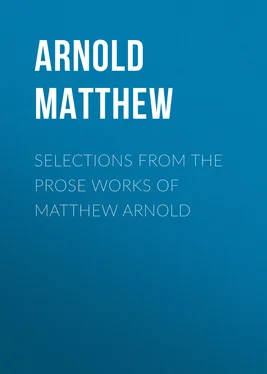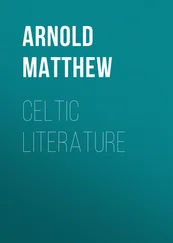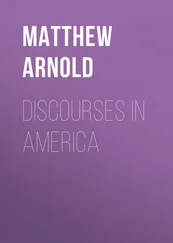Matthew Arnold - Selections from the Prose Works of Matthew Arnold
Здесь есть возможность читать онлайн «Matthew Arnold - Selections from the Prose Works of Matthew Arnold» — ознакомительный отрывок электронной книги совершенно бесплатно, а после прочтения отрывка купить полную версию. В некоторых случаях можно слушать аудио, скачать через торрент в формате fb2 и присутствует краткое содержание. Жанр: foreign_prose, literature_19, foreign_antique, на английском языке. Описание произведения, (предисловие) а так же отзывы посетителей доступны на портале библиотеки ЛибКат.
- Название:Selections from the Prose Works of Matthew Arnold
- Автор:
- Жанр:
- Год:неизвестен
- ISBN:нет данных
- Рейтинг книги:5 / 5. Голосов: 1
-
Избранное:Добавить в избранное
- Отзывы:
-
Ваша оценка:
- 100
- 1
- 2
- 3
- 4
- 5
Selections from the Prose Works of Matthew Arnold: краткое содержание, описание и аннотация
Предлагаем к чтению аннотацию, описание, краткое содержание или предисловие (зависит от того, что написал сам автор книги «Selections from the Prose Works of Matthew Arnold»). Если вы не нашли необходимую информацию о книге — напишите в комментариях, мы постараемся отыскать её.
Selections from the Prose Works of Matthew Arnold — читать онлайн ознакомительный отрывок
Ниже представлен текст книги, разбитый по страницам. Система сохранения места последней прочитанной страницы, позволяет с удобством читать онлайн бесплатно книгу «Selections from the Prose Works of Matthew Arnold», без необходимости каждый раз заново искать на чём Вы остановились. Поставьте закладку, и сможете в любой момент перейти на страницу, на которой закончили чтение.
Интервал:
Закладка:
But Burke is so great because, almost alone in England, he brings thought to bear upon politics, he saturates politics with thought. It is his accident that his ideas were at the service of an epoch of concentration, not of an epoch of expansion; it is his characteristic that he so lived by ideas, and had such a source of them welling up within him, that he could float even an epoch of concentration and English Tory politics with them. It does not hurt him that Dr. Price 32 32 ~Richard Price, D.D.~ (1723-91), was strongly opposed to the war with America and in sympathy with the French revolutionists.
and the Liberals were enraged with him; it does not even hurt him that George the Third and the Tories were enchanted with him. His greatness is that he lived in a world which neither English Liberalism nor English Toryism is apt to enter;—the world of ideas, not the world of catchwords and party habits. So far is it from being really true of him that he "to party gave up what was meant for mankind," 33 33 From Goldsmith's epitaph on Burke in the Retaliation .
that at the very end of his fierce struggle with the French Revolution, after all his invectives against its false pretensions, hollowness, and madness, with his sincere convictions of its mischievousness, he can close a memorandum on the best means of combating it, some of the last pages he ever wrote,—the Thoughts on French Affairs , in December 1791,—with these striking words:—
"The evil is stated, in my opinion, as it exists. The remedy must be where power, wisdom, and information, I hope, are more united with good intentions than they can be with me. I have done with this subject, I believe, forever. It has given me many anxious moments for the last two years. If a great change is to be made in human affairs, the minds of men will be fitted to it; the general opinions and feelings will draw that way. Every fear, every hope will forward it: and then they who persist in opposing this mighty current in human affairs, will appear rather to resist the decrees of Providence itself, than the mere designs of men. They will not be resolute and firm, but perverse and obstinate. "
That return of Burke upon himself has always seemed to me one of the finest things in English literature, or indeed in any literature. That is what I call living by ideas: when one side of a question has long had your earnest support, when all your feelings are engaged, when you hear all round you no language but one, when your party talks this language like a steam-engine and can imagine no other,—still to be able to think, still to be irresistibly carried, if so it be, by the current of thought to the opposite side of the question, and, like Balaam, 34 34 ~Num. XXII~, 35.
to be unable to speak anything but what the Lord has put in your mouth . I know nothing more striking, and I must add that I know nothing more un-English.
For the Englishman in general is like my friend the Member of Parliament, and believes, point-blank, that for a thing to be an anomaly is absolutely no objection to it whatever. He is like the Lord Auckland 35 35 ~William Eden, First Baron Auckland~ (1745-1814), English statesman. Among other services he represented English interests in Holland during the critical years 1790-93.
of Burke's day, who, in a memorandum on the French Revolution, talks of "certain miscreants, assuming the name of philosophers, who have presumed themselves capable of establishing a new system of society." The Englishman has been called a political animal, and he values what is political and practical so much that ideas easily become objects of dislike in his eyes, and thinkers "miscreants," because ideas and thinkers have rashly meddled with politics and practice. This would be all very well if the dislike and neglect confined themselves to ideas transported out of their own sphere, and meddling rashly with practice; but they are inevitably extended to ideas as such, and to the whole life of intelligence; practice is everything, a free play of the mind is nothing. The notion of the free play of the mind upon all subjects being a pleasure in itself, being an object of desire, being an essential provider of elements without which a nation's spirit, whatever compensations it may have for them, must, in the long run, die of inanition, hardly enters into an Englishman's thoughts. It is noticeable that the word curiosity , which in other languages is used in a good sense, to mean, as a high and fine quality of man's nature, just this disinterested love of a free play of the mind on all subjects, for its own sake,—it is noticeable, I say, that this word has in our language no sense of the kind, no sense but a rather bad and disparaging one. But criticism, real criticism, is essentially the exercise of this very quality. It obeys an instinct prompting it to try to know the best that is known and thought in the world, irrespectively of practice, politics, and everything of the kind; and to value knowledge and thought as they approach this best, without the intrusion of any other considerations whatever. This is an instinct for which there is, I think, little original sympathy in the practical English nature, and what there was of it has undergone a long benumbing period of blight and suppression in the epoch of concentration which followed the French Revolution.
But epochs of concentration cannot well endure forever; epochs of expansion, in the due course of things, follow them. Such an epoch of expansion seems to be opening in this country. In the first place all danger of a hostile forcible pressure of foreign ideas upon our practice has long disappeared; like the traveller in the fable, therefore, we begin to wear our cloak a little more loosely. Then, with a long peace, the ideas of Europe steal gradually and amicably in, and mingle, though in infinitesimally small quantities at a time, with our own notions. Then, too, in spite of all that is said about the absorbing and brutalizing influence of our passionate material progress, it seems to me indisputable that this progress is likely, though not certain, to lead in the end to an apparition of intellectual life; and that man, after he has made himself perfectly comfortable and has now to determine what to do with himself next, may begin to remember that he has a mind, and that the mind may be made the source of great pleasure. I grant it is mainly the privilege of faith, at present, to discern this end to our railways, our business, and our fortune-making; but we shall see if, here as elsewhere, faith is not in the end the true prophet. Our ease, our travelling, and our unbounded liberty to hold just as hard and securely as we please to the practice to which our notions have given birth, all tend to beget an inclination to deal a little more freely with these notions themselves, to canvass them a little, to penetrate a little into their real nature. Flutterings of curiosity, in the foreign sense of the word, appear amongst us, and it is in these that criticism must look to find its account. Criticism first; a time of true creative activity, perhaps,—which, as I have said, must inevitably be preceded amongst us by a time of criticism,—hereafter, when criticism has done its work.
It is of the last importance that English criticism should clearly discern what rule for its course, in order to avail itself of the field now opening to it, and to produce fruit for the future, it ought to take. The rule may be summed up in one word,— disinterestedness . And how is criticism to show disinterestedness? By keeping aloof from what is called "the practical view of things"; by resolutely following the law of its own nature, which is to be a free play of the mind on all subjects which it touches. By steadily refusing to lend itself to any of those ulterior, political, practical considerations about ideas, which plenty of people will be sure to attach to them, which perhaps ought often to be attached to them, which in this country at any rate are certain to be attached to them quite sufficiently, but which criticism has really nothing to do with. Its business is, as I have said, simply to know the best that is known and thought in the world, and by in its turn making this known, to create a current of true and fresh ideas. Its business is to do this with inflexible honesty, with due ability; but its business is to do no more, and to leave alone all questions of practical consequences and applications, questions which will never fail to have due prominence given to them. Else criticism, besides being really false to its own nature, merely continues in the old rut which it has hitherto followed in this country, and will certainly miss the chance now given to it. For what is at present the bane of criticism in this country? It is that practical considerations cling to it and stifle it. It subserves interests not its own. Our organs of criticism are organs of men and parties having practical ends to serve, and with them those practical ends are the first thing and the play of mind the second; so much play of mind as is compatible with the prosecution of those practical ends is all that is wanted. An organ like the Revue des Deux Mondes , 36 36 ~Revue des deux Mondes~. The best-known of the French magazines devoted to literature, art, and general criticism, founded in Paris in 1831 by Francois Buloz.
having for its main function to understand and utter the best that is known and thought in the world, existing, it may be said, as just an organ for a free play of the mind, we have not. But we have the Edinburgh Review , existing as an organ of the old Whigs, and for as much play of the mind as may suit its being that; we have the Quarterly Review , existing as an organ of the Tories, and for as much play of mind as may suit its being that; we have the British Quarterly Review , existing as an organ of the political Dissenters, and for as much play of mind as may suit its being that; we have the Times , existing as an organ of the common, satisfied, well-to-do Englishman, and for as much play of mind as may suit its being that. And so on through all the various fractions, political and religious, of our society; every fraction has, as such, its organ of criticism, but the notion of combining all fractions in the common pleasure of a free disinterested play of mind meets with no favor. Directly this play of mind wants to have more scope, and to forget the pressure of practical considerations a little, it is checked, it is made to feel the chain. We saw this the other day in the extinction, so much to be regretted, of the Home and Foreign Review . 37 37 ~Home and Foreign Review~. Published in London 1862-64.
Perhaps in no organ of criticism in this country was there so much knowledge, so much play of mind; but these could not save it. The Dublin Review subordinates play of mind to the practical business of English and Irish Catholicism, and lives. It must needs be that men should act in sects and parties, that each of these sects and parties should have its organ, and should make this organ subserve the interests of its action; but it would be well, too, that there should be a criticism, not the minister of these interests, not their enemy, but absolutely and entirely independent of them. No other criticism will ever attain any real authority or make any real way towards its end,—the creating a current of true and fresh ideas.
Интервал:
Закладка:
Похожие книги на «Selections from the Prose Works of Matthew Arnold»
Представляем Вашему вниманию похожие книги на «Selections from the Prose Works of Matthew Arnold» списком для выбора. Мы отобрали схожую по названию и смыслу литературу в надежде предоставить читателям больше вариантов отыскать новые, интересные, ещё непрочитанные произведения.
Обсуждение, отзывы о книге «Selections from the Prose Works of Matthew Arnold» и просто собственные мнения читателей. Оставьте ваши комментарии, напишите, что Вы думаете о произведении, его смысле или главных героях. Укажите что конкретно понравилось, а что нет, и почему Вы так считаете.












